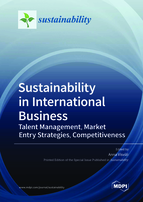Sustainability in International Business: Talent Management, Market Entry Strategies, Competitiveness
A special issue of Sustainability (ISSN 2071-1050). This special issue belongs to the section "Economic and Business Aspects of Sustainability".
Deadline for manuscript submissions: closed (30 November 2021) | Viewed by 88969
Special Issue Editor
2. Effat College of Business, Effat University, Jeddah 21551, Saudi Arabia
Interests: smart cities; smart villages; international political economy (IPE); information and communication technology (ICT)
Special Issues, Collections and Topics in MDPI journals
Special Issue Information
Dear Colleagues,
The increasing velocity of international transactions; the technology-enhanced growing interconnectedness of people, business, and societies; and, finally, the escalating density of the day-to-day business interactions are the key sources of challenges that organizations, both in public and private sectors, are facing today. The opportunities inherent in these processes as well as the side effects that they generate have an impact on all stakeholders involved, including employees, investors, and society. As a result, the same processes have a direct impact on key managerial decisions pertaining to business performance, growth and development strategies, forms of market entry, and sources of competitive advantage. The most recent advances in economic collaboration and integration around the world and their implications for the business sector add several new layers to the already complex environment in which international business sustainability has to be mastered. This Special Issue seeks to tap into this.
The Guest Editor of this Special Issue welcomes submissions that address, but are not limited to, the following issues:
- Technology-enhanced tools and strategies for sustainability in international business;
- Talent management as a function of business sustainability, competitiveness, and success;
- Navigating challenges and opportunities in international business: from business strategy to day-to-day business operation;
- Employees turnover and sustainability in context of international business;
- Managing cultural diversity in international business as a function of sustainability;
- Novel, sustainable, green, and tech-enhanced business development strategies;
- ICT-enhanced tools and applications and international business;
- Sophisticated technology, including AI, 5G, block chain and other, and business development strategies in an international context;
- Case-studies, including Belt and Road Initiative (BRI), China, EU, Asia etc.;
- Comparative insights;
- Covid-19 inflicted implications.
Prof. Anna Visvizi
Guest Editor
Manuscript Submission Information
Manuscripts should be submitted online at www.mdpi.com by registering and logging in to this website. Once you are registered, click here to go to the submission form. Manuscripts can be submitted until the deadline. All submissions that pass pre-check are peer-reviewed. Accepted papers will be published continuously in the journal (as soon as accepted) and will be listed together on the special issue website. Research articles, review articles as well as short communications are invited. For planned papers, a title and short abstract (about 100 words) can be sent to the Editorial Office for announcement on this website.
Submitted manuscripts should not have been published previously, nor be under consideration for publication elsewhere (except conference proceedings papers). All manuscripts are thoroughly refereed through a single-blind peer-review process. A guide for authors and other relevant information for submission of manuscripts is available on the Instructions for Authors page. Sustainability is an international peer-reviewed open access semimonthly journal published by MDPI.
Please visit the Instructions for Authors page before submitting a manuscript. The Article Processing Charge (APC) for publication in this open access journal is 2400 CHF (Swiss Francs). Submitted papers should be well formatted and use good English. Authors may use MDPI's English editing service prior to publication or during author revisions.
Keywords
- Sustainability
- Sustainable Development Goals (SDGs)
- AI
- 5G
- B2B
- BMI
- Talent management
- Technology diffusion
- International business






